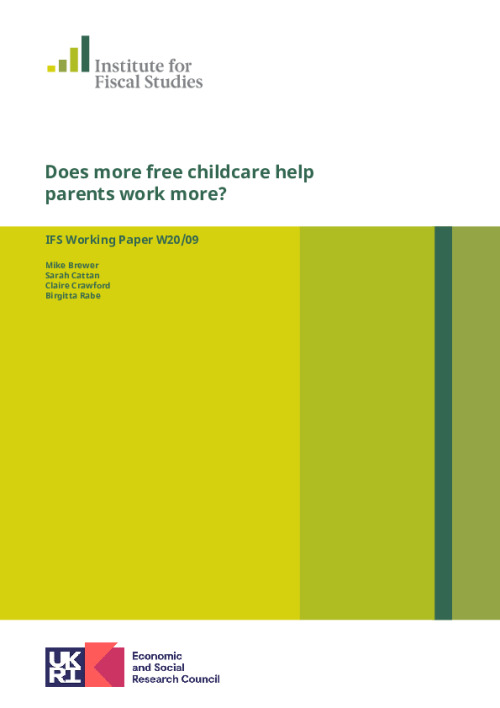Downloads

WP202009-Does-more-free-childcare-help-parents-work-more.pdf
PDF | 979.26 KB
Many governments are considering expanding childcare subsidies to increase the labour force participation of parents (especially mothers) with young children. In this paper, we study the potential impact of such a policy by comparing the effects of offering free part-time childcare and of expanding this offer to the whole school day in the context of England. We use two different strategies exploiting free childcare eligibility rules based on date of birth. Both strategies suggest that free part-time childcare only marginally affects the labour force participation of mothers whose youngest child is eligible, but expanding from part-time to full-time free childcare leads to significant increases in labour force partici-pation and employment of these mothers. These effects emerge immediately and grow over the months following entitlement. We find no evidence that parents adjust their labour supply in anticipation of their children’s entitlement to free childcare.
Authors

Mike Brewer

Research Fellow University College London
Claire is a Research Fellow at IFS, working on the determinants and consequences of participation in childcare and education for parents and children.

Associate Director
Sarah is an Associate Director in the Education and Skills sector at the IFS, holding a British Academy Postdoctoral Fellowship.

Birgitta Rabe
Working Paper details
- DOI
- 10.1920/wp.ifs.2020.920
- Publisher
- The IFS
Suggested citation
Brewer, M et al. (2020). Does more free childcare help parents work more?. London: The IFS. Available at: https://ifs.org.uk/publications/does-more-free-childcare-help-parents-work-more-0 (accessed: 6 May 2024).
More from IFS
Understand this issue

Public investment: what you need to know
25 April 2024

The £600 billion problem awaiting the next government
25 April 2024

If you can’t see it, you can’t be it: role models influence female junior doctors’ choice of medical specialty
24 April 2024
Policy analysis

Recent trends in and the outlook for health-related benefits
19 April 2024

4.2 million working-age people now claiming health-related benefits, could rise by 30% by the end of the decade
19 April 2024

Progression of nurses within the NHS
12 April 2024
Academic research

The consequences of miscarriage on parental investments
22 March 2024

6th World Bank/IFS/ODI Public Finance Conference | Driving Progress: Public Finance and Structural Transformation

A senior doctor like me: Gender match and occupational choice
24 April 2024